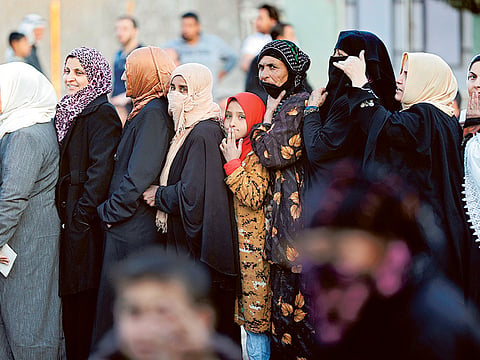650,000 Mosul residents face food and water shortage
Reports emerge that Daesh shot dead 27 civilians in public last week for collaborating with the army

Mosul: The United Nations issued a fresh warning on Wednesday about the humanitarian situation in eastern Mosul where the US-backed Iraqi army is locked in heavy fighting with Daesh militants.
More than six weeks into the offensive against Daesh’s last major city stronghold in Iraq, the army is trying to dislodge militants dug in among civilians in the eastern districts, the only side Iraqi troops have been able to breach.
“The situation in eastern Mosul city close to the front lines remains fraught with danger for civilians.
Mortar and gunfire continue to claim lives,” the UN humanitarian coordinator’s office said. “The limited supplies of food and water are running out, amid concerning reports of food insecurity emerging from the city.” Water was cut to 650,000 people — or 40 per cent of total residents in the city when a pipeline was hit during fighting — a local official said on Tuesday.
With winter setting in, aid workers say a full siege is developing around the city and poor families are struggling to feed themselves as prices have risen sharply.
The longer the conflict drags on, the more civilians will suffer as they are also exposed to violence from the militants bent on crushing any opposition to their rule.
Deputy UN High Commissioner for Human Rights Kate Gilmore said on Wednesday there were reports that Daesh, which has killed residents it suspects of collaborating with the Iraqi army, shot dead 27 civilians in public in Mosul’s Muhandiseen Park last week.
The capture of Mosul, the largest city under control of Daesh in both Iraq and Syria, is seen as crucial towards dismantling the caliphate which the militants declared over parts of the two countries, after sweeping through Sunni populated northern and western Iraqi provinces in 2014.
Iraqi government and Kurdish forces surround the city from the north, east and south, while Popular Mobilisation forces — a coalition of Iranian-backed Shiite groups — are trying to close in from the west.
Last week, Popular Mobilisation fighters cut the supply route to Mosul from Daesh-held territory in Syria, driving up food prices in the city.
With the last supply route cut off, basic commodity prices in Mosul could double “in the short term”, said a humanitarian worker, who declined to be identified.
Some 100,000 Iraqi government troops, Kurdish security forces and mainly Shiite militiamen are participating in the assault on Mosul that began on October 17, with air and ground support from a US-led international military coalition.
Iraqi forces moving from the east are trying to advance to the Tigris river that runs through Mosul’s centre, in the biggest battle in Iraq since the 2003 US-led invasion that toppled Saddam Hussain.
The Iraqi military estimates there are 5,000-6,000 insurgents in Mosul, resisting the advancing troops with suicide car bombs and sniper and mortar fire that also kill civilians.
Daesh leader Abu Bakr Al Baghdadi, believed to be somewhere near the Syrian border, has told his fighters there can be no retreat from the city.
Some 74,000 civilians have fled Mosul and nearby areas so far, and the United Nations is preparing for a worst-case scenario in which more than a million people are made homeless as winter descends and food shortages set in.
The winter’s cloudy skies favour the militants, Iraqi officers told Reuters in eastern Mosul on Wednesday.
“When the weather is like this they take advantage,” said Maan Al Saadi, a commander of the elite Counter Terrorism Service (CTS), which is fighting inside the city as it advances from the east.
“The main goal for CTS is the river,” said Sami Al Aridhi, referring to the Tigris that cuts Mosul in two, about 3.5 kilometres away. “The federal police and the army will deal with the western part of the city,” he said.
Sign up for the Daily Briefing
Get the latest news and updates straight to your inbox

